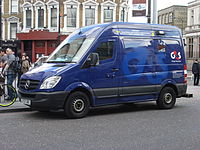



Cash-in-transit (CIT) or cash/valuables-in-transit (CVIT) is the physical transfer of banknotes, coins, credit cards and items of value from one location to another. The locations include cash centers and bank branches, ATM points, bureaux de change, large retailers and other premises holding large amounts of cash, such as ticket vending machines and parking meters.
Many cash-in-transit companies are private security companies that offer cash handling as part of their services. Loomis, following its split from Securitas, and Shields Business Solutions, a private equity backed company, are the only major CIT businesses fully dedicated to cash handling. Brinks spun off its home security division, likewise placing its focus on cash handling.
By law, the CIT companies are seen as logistics companies in the private security industry and therefore have to comply with transport and security legislation. In some countries, the transportation of cash has its own legislation (for example, Europe has varying CIT laws). The CIT industry is regulated by national, regional and local legislation, social regulations and current practices. Responsible authorities are usually the Ministry of the Interior, the Ministry of Justice and the police. Legislation and regulations may impose requirements and restrictions on use of firearms, types of vehicles, minimum number of crew members, and use of intelligent banknote neutralisation systems.

CIT services can be carried out in soft-skinned, semi-armoured or armoured vehicles. The use of soft-skinned vehicles is normally only allowed when alternative security methods, such as intelligent banknote neutralisation systems, are also used. Security cases containing IBNS are provided by companies as StrongPoint Cash Security and Oberthür. Such CIT is commonly referred to as "Light CIT".
Services
Inside CIT, the companies are specialized in the transportation and processing of cash, valuables and precious metals. They transport banknotes, coins, bulk cash, diamonds, non-personalised smart cards, non-personalised passports and other valuables. That is why, in many countries, the service was renamed "asset handling" or "asset-in-transit".
Cash processing
Cash processing is an industrial process far removed from traditional banking activities and culture. The internal organization of cash handling within banks is often obsolete and inefficient, inherited from old bank organizations and further complicated by mergers, acquisitions and restructuring. This has led the majority of banks to opt for the outsourcing of wholesale cash processing which includes coin and banknote processing.
There are on the other hand inherent difficulties associated with outsourcing. One of them is the loss of control and the reliance on external providers. In some cases, banks no longer have the know-how in relation to cash handling.
Cash processing has evolved from a labor-intensive activity focused on the transportation of cash to a capital-intensive industry offering end-to end solutions. Transport no longer constitutes the value added in the business but continues to structure the organization. The CIT's footprint remains a key factor of selection by banks and retailers.
The industry is generally divided into two sectors: processing and ATM servicing.
CIT guards
Most armored cars have two to three occupants:
- A driver, who is normally never allowed to leave the vehicle until it returns to the garage
- 1–2 guards who deliver the cash or valuables
Depending on the jurisdiction, the guards are armed with weapons and required to wear bulletproof vests and/or ballistic helmets. Most guards are issued with shotguns, while others carry handguns. Submachine guns and even assault rifles may be equipped by those officers in some countries. These guards are required to have firearms training before they can carry them.
Five member states of the European Union, Denmark, Greece, Ireland, Sweden, and the Netherlands prohibit weapons during cash-in-transit operations.
See also
References
- "Securitas Cash Handling Services announces new international brand identity "Loomis"". Securitas Group. Archived from the original on 3 February 2014. Retrieved 18 November 2013.
- "Our Business". Loomis AB. Archived from the original on 2 February 2014. Retrieved 18 Nov 2013.
- "Shields Business Solutions and Egis Capital Partners Announce Partnership". Cision US Inc. Retrieved 11 Jan 2024.
- "The Brink's Company to Spin-Off Brink's Home Security to Shareholders". PR Newswire. Retrieved 18 Nov 2013.
- "A comparative overview of the legislations governing the Cash in Transit private industry in the 15 EU members" (PDF). Confederation of European Security Services. Archived from the original (PDF) on 2013-10-30. Retrieved 18 Nov 2013.
- "EU WHITE PAPER ON PROFESSIONAL CROSS BORDER TRANSPORTATION OF EURO CASH BY ROAD – EBF WISHLIST" (PDF). European Banking Federation. Retrieved 18 Nov 2013.
- "Session IV: Cash Outsourcing and Cash Recycling" (PDF). European Security Transport Association. Archived from the original (PDF) on 10 June 2015. Retrieved 18 Nov 2013.
- "Specific Requirements and Training for a ARMOURED CAR GUARD" (PDF). BC Ministry of Justice. June 2009. Archived from the original (PDF) on August 6, 2009.
- "A comparative overview of the legislations governing the Cash in Transit private industry in the 15 EU members A comparative overview of the legislations governing the Cash in Transit private industry in the 15 EU members" (PDF).